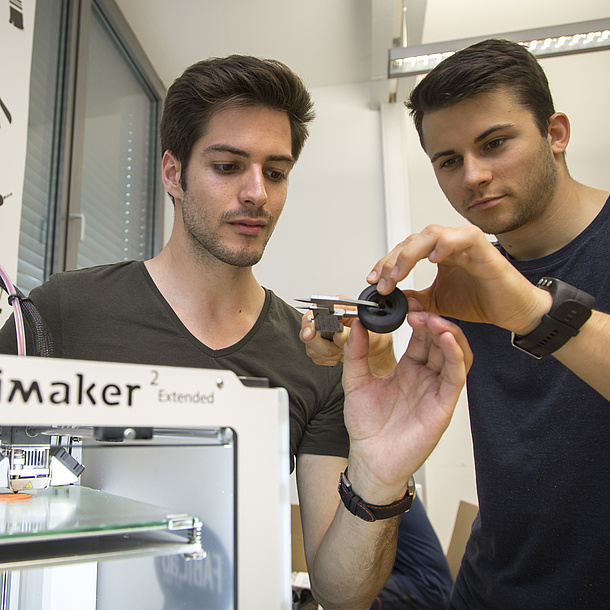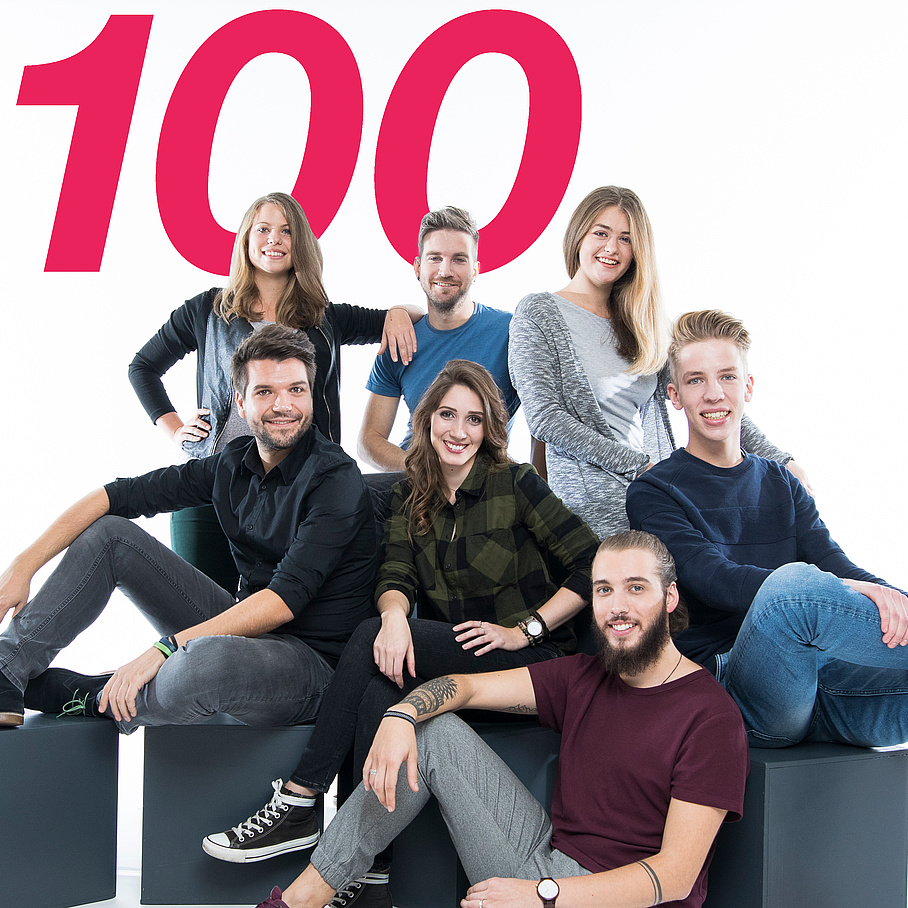- Duration of study: 4 Semester
- ECTS credit points: 120
- Academic degree:
Diplom-Ingenieurin
orDiplom-Ingenieur
(Dipl.Ing. or DI), equivalent to the Master of Science (MSc) - Language of instruction: English
The Master's Programme
In this internationally oriented degree programme, you acquire technical and economic knowledge and study topics such as agile management, digitalised production, pioneering product innovations, or innovative materials. In addition, you deepen your knowledge of production science, production technology and production management. The special feature of the master’s degree programme Production Science and Management
is that economic and technical disciplines are prioritised equally while being taught.
The strong available cooperation with regional industrial partners allows students to gain deep insights into practical work during their studies. Thus, leading personalities from the economic sector contribute significantly to the teaching, and real tasks from the industrial sector are already encountered and dealt with during the degree programme.
An excellent research infrastructure is available to students, including
- Laboratories of the institutes of Innovation and Industrial Management, Production Engineering, Engineering and Business Informatics, Material Science.
- Laboratories of the Institute of Production Engineering, Institute of Materials Science, and Institute of Machine Components.
- Smart Factory: In this model factory – with a focus on Industry 4.0 – you can test digitalised production technologies used during product manufacturing, e.g. the gearbox of an electric engine.
- Schumpeter Laboratory for Innovation: You have access to state-of-the-art infrastructure such as digital production machines and extensive multimedia and communication systems (e.g. laser cutters, water jet cutters, CNC milling machines, 3D printers). In this laboratory, you develop a real prototype from the generation of the idea to the production of a marketable product prototype.
- LEAD Factory: in a
downsized
industrial production facility, you acquire knowledge about lean management, energy efficiency, agile production and digitalisation.
In the master's degree programme Production Science and Management, you can expand the basic engineering and economic knowledge you have already acquired in the bachelor's degree programmes Mechanical Engineering or Mechanical Engineering and Business Economics in the following areas of specialisation:
- Basics: You learn methods that can be used for the technical and economic design of production systems. These include the selection of materials, the planning of manufacturing processes and the design of production processes, as well as the intelligent use of information technologies.
- Advanced Technologies: You become familiar with and construct industrial work systems and plant layouts, design ergonomic workplaces and develop and design products to comply with production requirements. Furthermore, you learn more about the automation of production systems.
- Management and Operations: You learn about corporate management and corporate planning, marketing and controlling, technology management and product innovations. You learn more about the connection between business and production strategy in a technology-intensive market environment and how to apply supply management, production planning, production control and quality management tools.
You have a chance to actively network, for example, in the course Product Innovation Project. In this project, students from different disciplines and of different nationalities work in teams to solve new problems faced in industry. Industry partners and researchers from TU Graz and international partner universities provide the student teams with support while they solve these problems.
Are you considering becoming self-employed or establishing a sole proprietorship business? Then you will receive support from experienced mentors from the business world in the Gründungsgarage.
The student association WINGnet connects students with representatives in technical and economic degree programmes. Networking meetings with business and industry representatives are organised, who can serve as points of contact during your studies and also help you begin a successful professional career. WINGnet Graz is also part of ESTIEM (European STudents of Industrial Engineering and Management), the European network of industrial engineering students.
Numerous established cooperations with national and international companies, such as Andritz, AVL, Magna, Miba, Siemens, Ventrex, voestalpine, Google and Microsoft, provide students with valuable insights into the corporate practice. In terms of university cooperation, a lively scientific exchange has been established with the Harvard Business School, among others. In terms of professorial cooperation, researchers in the field of techno-economics at TU Graz have established firm networks within TU Austria and are heavily involved in the network of European Professors of Industrial Engineering and Management (EPIEM).
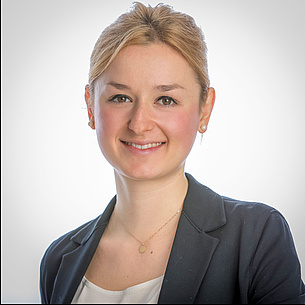
The master’s programme Production Science and Management helped me to grow both professionally and personally. My technical background was perfectly complemented by the entrepreneurial knowledge I gained in the master's programme, since it offers holistic training through its specialisations in mechanical engineering, business and social skills. This enables me to think and work in a solution-oriented and effective way, which is very helpful in my job as a university assistant.
Double Degree Programme
Within the framework of the Master’s degree programme, you can complete a Double Degree Programme with the Free University of Bozen-Bolzano (Italy). You study both at TU Graz and Free University of Bozen-Bolzano and receive a degree from both universities.
At TU Graz, you will complete at least 51 ECTS:
- from the compulsory module Basics: 7.5 ECTS
- from the compulsory modules Factory Planning and Automation: 12 ECTS
- from the compulsory modules Management and Operations: 14.5 ECTS
- from the catalogues of elective modules C3, B3, B4: 17 ECTS
At the Free University of Bozen-Bolzano, you will complete at least 60 ECTS:
- from the Master's programme in Industrial Mechanical Engineering: 25 ECTS
- from the Master's programme in Entrepreneurship and Innovation: 5 ECTS
- Master's thesis under the joint supervision of lecturers from both universities: 30 ECTS
In addition, you must complete freely selectable courses worth 9 ECTS credits.
Further information can be found in the curriculum.
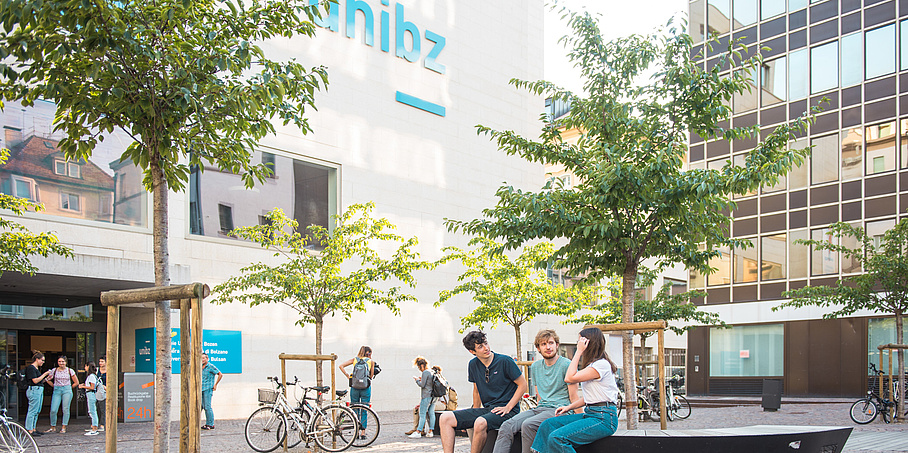
On courses and content
Matthias WOLF
Ass.Prof. Dipl.-Ing. Dr.techn. BSc
Institute of Innovation and Industrial Management
matthias.wolf@tugraz.at
On the mobility scholarship
Manuel AUSSERLECHNER
MA
International Office
manuel.ausserlechner@tugraz.at
Admission
The prerequisite for admission is a completed bachelor’s degree in a relevant subject (see curriculum).
Additionally, you need to provide evidence of competence in the English language.
Admission without admission procedure
Students, who have already been admitted to the Master's programme Production Science and Management at TU Graz as well as graduates of the following Bachelor’s programmes at TU Graz are eligible for the Master’s programme without an admissions procedure:
Graduates of other programmes offered at TU Graz can apply for admission at the Registrar's Office.
Admission with admission procedure
Graduates of a previous study programme not mentioned above undergo an admission procedure.
Registration for the academic year 2027/28: 15 October to 15 December 2026
You can complete the admission procedure before the end of your bachelor’s studies.
- Admission and deadlines for international students
- Admission and deadlines for Austrian students who are registering to study at TU Graz for the first time
If you have already been admitted to a degree programme at TU Graz, or have studied at TU Graz before, please come to the Registrar's Office in person to complete your admission during the admission period.
Contact study@tugraz.at
Career Prospects
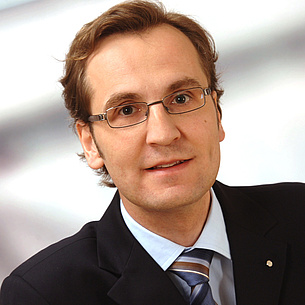
In this time of global techno-economic change, Production Science and Management graduates are more in demand than ever in many industries, because they are highly educated and motivated people with technical know-how, economic knowledge and take a holistic approach to solving problems and applying problem-solving skills.
Graduates of this degree programme have in-depth knowledge of fundamental technical and economic aspects of production science and, therefore, have excellent chances on the job market.
They work in interdisciplinary positions between technology and business in a variety of fields of activity and industries:
- They are responsible for the development, planning, procurement, production and marketing of products and advanced technologies.
- They solve technical and economic problems.
- They manage international projects.
- They manage intercultural and multidisciplinary teams of experts and assume entrepreneurial responsibility.
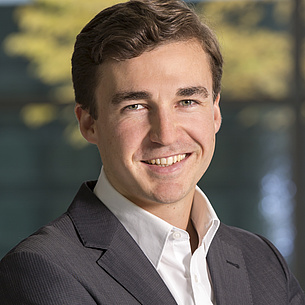
The master's degree programme in Production Science and Management gave me the ideal preparation to meet challenges in the industry. Above all, the numerous external lecturers shared practical knowledge that I’ve already been able to apply during my career. I found the course with Harvard Case Studies and the elective in the Learning Factory the most exciting, because we had a chance to work in teams to solve practical problems that we could encounter in real life.
Acquire AI skills: AIE Extension Programme
Increase your career prospects with the Artificial Intelligence Engineering (AIE) extension programme and learn essential skills in AI development and application during or after completing your Master's degree.
